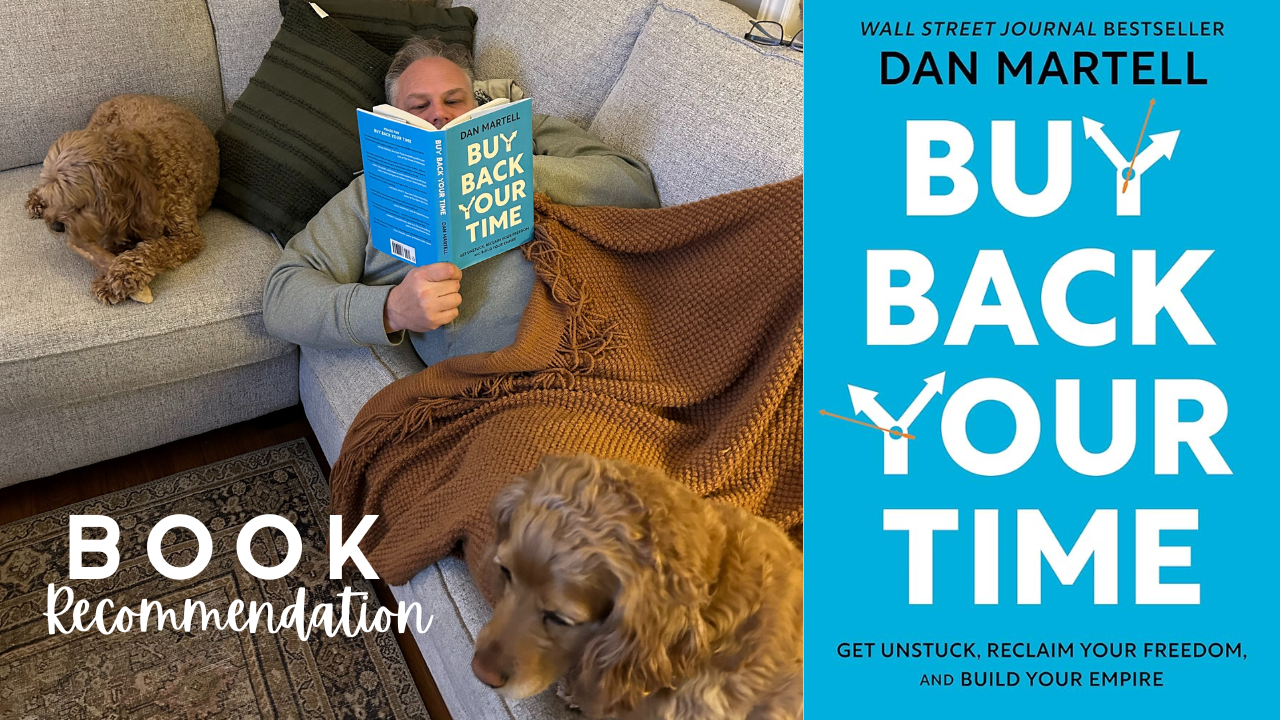Buy Back Your Time

DESCRIPTION:
Learn to conquer the one real hurdle to scaling your company and growing rich: Time
How you use your free time will make or break your success. The secret? It’s not about working harder or finding more time to do work. It’s about designing the freedom to engage in the high-value work that brings you energy and fulfillment. This is at the heart of the message that has made Dan Martell the world’s most popular SaaS (Software-as-a-Service) coach. Now, in his first book, Buy Back Your Time, he teaches entrepreneurs at every level how to scale their business, fast, while avoiding burnout. Trading money for time—that is, literally buying back free space in your calendar—will give you more financial success than you ever dreamed was possible.
With over two decades of experience as a serial entrepreneur and founder, Dan Martell will teach you the secrets to work less and play more while building an empire. He’ll dig into the practical steps that will allow you to start buying back ...
Strategic Planning 1: Navigating HR

This month we’re focusing on strategic planning. If you’ve been watching our social media at all, you know that I’ve been teaching about strategic planning at the Waterloo Chapter monthly meetings. These meetings are open to anyone, so I invite you to join us in December. For more information about the meetings, or to view the previous content that’s been presented, click HERE.
To begin our series, we’re going to focus on HR. This can feel a bit like navigating landmines, but by implementing some of the following tips and recommendations, you’ll be able to recruit and retain great employees.
- Implement effective recruitment and hiring practices
“Always be hiring” is advice we regularly give. Finding the right person is more important than just filling a position, so always be looking for great people. Then once you find them – or they find you – you’ll be more prepared to find a spot for them.
One of the best ways to ensure you hire well is to encourage referrals. Your current...
Owner Health: The Healthy Workplace

Over the last four articles, we’ve been talking about how we, as business owners can get healthy and stay healthy. We’ve talked about physical, mental and emotional health, as well as decision fatigue. For this article, we’re turning the attention to our staff and how we can promote a healthy work environment for them. Perhaps we can use some of the information we’ve gained over the last few articles to create a work environment and mentality that promotes the well-being of our greatest asset…our staff.
We are heading into darker and colder months, months that are generally harder for people. It is my desire, as I’m sure it’s yours, to provide an environment that acknowledges and actively seeks to provide for the needs of staff in order for them to be healthy and effective, as well as ensure they’re with us for the long haul.
A safe workplace
In my experience, the best thing we can do for our staff is to make sure they know it’s safe to talk to us. To share when they’re stressed, ov...
Open Book Management

"Great things in business are never done by one person. They’re done by a team of people." (Steve Jobs)
Open Book Management (OBM) is the philosophy that businesses will experience greater success by sharing relevant financial and operational information with every employee. It’s the practice of communicating with people via the numbers. Employees receive information that not only helps them do their jobs well but gives them an understanding of how the company is doing as a whole. According to John Case, who coined the phrase “open book management”, “a company performs best when its people see themselves as partners in the business rather than as hired hands". The intent is to give employees relevant information about the company so they can make better decisions as workers. This information includes, but is not limited to, revenue, profit, cost of goods sold, cash flow and expenses.
Open Book Management involves four basic practices:
- Train employees so they become business litera ...
The 4 Types of Organizational Culture

The original article by Kate Heinz and updated by Jessica Powers can be found HERE.
Organizational culture influences the success of your company, directly affecting the sort of candidates you attract and the employees you hold onto. There are several different types of organizational culture too; so you have to find the one that works best for you.
What Is Organizational Culture?
Organizational culture, or company culture, is defined as the shared values, attitudes and practices that characterize an organization. It’s the personality of your company, and it plays a large part in your employees’ overall satisfaction.
Having a strong organizational culture is important because it helps attract the right candidates and it keeps them engaged as employees. According to a 2019 Glassdoor study, 77 percent of adults would evaluate a company’s culture before applying to an open position, with more than half ranking an organization’s organizational culture as more important than compensati...

